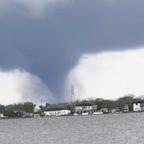Airport Check-in: In translation, on arrival
Seattle-Tacoma Airport reports an increase in demand for translation phones.
SEATTLE -- With international arrival traffic up 16% from 2007, Seattle-Tacoma has seen increasing demand for its phone translation service.
The airport's translation phones — equipped with two receivers for three-way conversation — are installed at all 22 immigration booths, plus in the main terminal and baggage-claim areas. California-based Language Line Services, which employs 3,000 translators for 170 languages, runs the service.
Immigration officials who interview arriving passengers use the service most frequently, says Sue Hansen-Smith, Sea-Tac's customer service manager. "I don't know what we'd do without it. It'd really slow down the (immigration clearing) process."
Korean is the most common language requested at the airport, followed by Mandarin, Khmer (Cambodian) and Vietnamese.
HOUSTON
These Texas rangers ride for the skies
Those horseback riders you may spot at George Bush Intercontinental aren't simply out for fun. In a unique approach to airport security, a group of volunteers known as the Airport Rangers has been patrolling airport grounds since 2003. About 500 active riders roam the 10,000-acre perimeter to alert airport officials of any suspicious or illegal activities. The volunteers also clear trails of debris and other foreign objects.
Volunteers must provide their own horse and must undergo a background check. Once approved, they can ride 25 miles of trails around the airport. "Having the Airport Rangers at Bush Intercontinental has worked for both horse lovers and (the airport). We get the extra level of security, and the volunteers have plenty of room to ride," says Rick Vacar, director of the Houston Airport System.
BOSTON
Tarmac material is first in USA to go green
Boston Logan says it will be the first U.S. airport to use environmentally friendly asphalt for repaving a runway.
The so-called warm mix asphalt is heated to between 250 and 275 degrees, up to 75 degrees less than is required for traditional "hot mix" asphalt.




